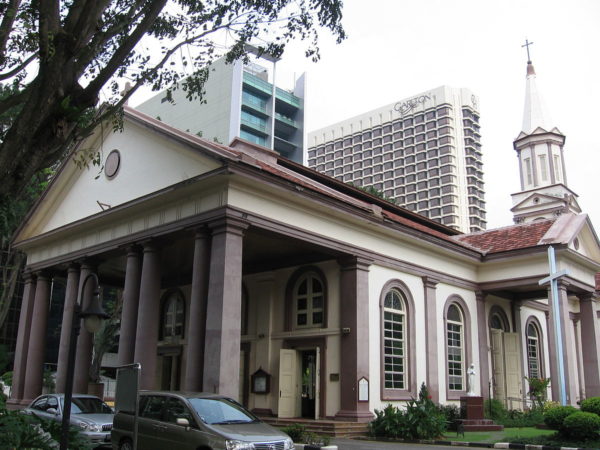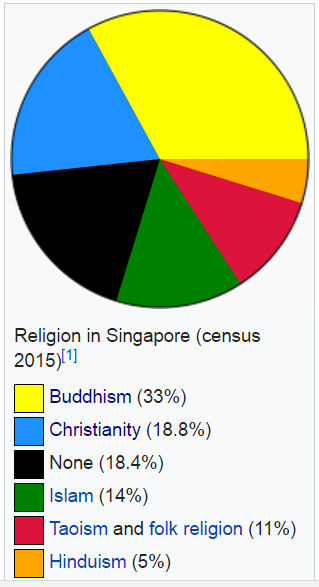 Today, Christians around the world celebrate Easter, remembering the resurrection of Jesus Christ around 2000 years ago. Although the Humanist movement and the Humanist Society in Singapore (also called HumanistSG) have occasionally been perceived as anti-religious, small numbers of Christians have been attending its events for years. Far from being ‘religious shoppers’ or confused people, these Christians are independent-minded and well-read, holding their own against both religious and non-religious standpoints. They are also passionate defenders of reason and Singapore’s secular space and are thus often supportive of many Humanist causes.
Today, Christians around the world celebrate Easter, remembering the resurrection of Jesus Christ around 2000 years ago. Although the Humanist movement and the Humanist Society in Singapore (also called HumanistSG) have occasionally been perceived as anti-religious, small numbers of Christians have been attending its events for years. Far from being ‘religious shoppers’ or confused people, these Christians are independent-minded and well-read, holding their own against both religious and non-religious standpoints. They are also passionate defenders of reason and Singapore’s secular space and are thus often supportive of many Humanist causes.
One of them is John Hui, a Singaporean Christian man in his 40s. Today, we talk to him about his eight years of experience in the Humanist movement. The viewpoints expressed are solely his own.
What is your religious belief?
John: I am a Christian. I became a Christian during my university days. It was not through other Christians’ evangelism attempts, but through my reading of books, I bought from various bookshops. At that time I found both Buddhism (not Daoism) and Christianity to be attractive (even though I was hostile towards both Buddhists and Christians who attempted to convert me to their respective worldviews) and hence I read both Buddhist and Christian books.
As I read I became more and more skeptical of Christianity and more and more attracted to Buddhism. However, in the end, Christianity won the tug-of-war. About one or two years after I became a Christian, I chose to join the Methodist denomination because I was impressed by the work and words of John Wesley (18th-century revivalist), the father of Methodism. Usually, I go to a handful of Methodist churches though I also enjoy participating in the Mass held in the Cathedral of the Good Shepherd (below) of the Roman Catholic Church.
How did you come to join the Humanist Society?
John: Back in 2009, I was already hoping and looking out for an organised group that can represent the non-religious in Singapore. I almost proceeded to set up one myself if not for the formation of the informal group Com.passion.com by some other persons who soon after invited me to join them (which I did). In such a context, I chanced upon an online humanist forum called the Singapore Humanism Meetup.* This online forum was run by a man called Ryan. I started participating actively in that forum. Over there and over time, I got to know a number of humanists and atheists. Some of them subsequently formed Humanist Society (Singapore) in October 2010 and I joined it as a member in November 2010.
*Admin note: The Singapore Humanism Meetup was a series of gatherings that came before the HumanistSG.
What is your first impression of humanists and atheists?
John: Very argumentative people! LOL
Have you met any hostile reactions?
John: I have not encountered any hostile reactions directed at me. I came across occasional scornful remarks but I do not consider those to be hostile.
How do you feel whenever the HumanistSG releases statements that are critical of religion? Or other religious institutions?
John: So far, those statements that I have come across are sensible statements.
Have you met other Christians or any other religious people at the Society? If yes, what do you say to them?
John: Yes, I have. If I have not already known them beforehand, I tend to ask them whether or not they believe the key content of their religious faiths. This is because I am aware that there can be atheists who identify themselves as “cultural Christians” or “cultural Buddhists” (back in 2010 I came across an atheist who identifies himself as a “cultural Christian” who attends church services regularly). Most of the handful of Christians I met in HumanistSG are believing Christians.
How did the humanists, atheists and agnostics react whenever you revealed you are a Christian? How did you respond to them?
John: Typically, they would wonder how I can be a humanist who believe in evidence-based critical reasoning and yet at the same time be a believing Christian. They would usually think that evidence-based critical reasoning contradicts Christianity. Just last week, after the Humanist Cafe (a monthly event), one atheist asked me how I managed to reconcile my Christian conviction with being a humanist. Whenever I have sufficient time to respond to such questions, I would point out a few things:
1. Historically, the earliest modern humanists were Christians and theists/deists. Humanists per se need not be non-religious. The essential elements of being a humanist per se is the adherence to humanistic values such as the promotion of human well-being base on evidence, reason, and compassion. The types of humanists include secular humanists, atheistic humanists and religious humanists (note: secular humanists is not exactly equivalent to atheistic humanists).
2. When a religious person discovers that certain elements in his religious worldviews contradict evidence-based critical reasoning, then he ought NOT continue to believe in those elements. There are elements within Christianity that I do not hold a belief in. One example would be the large scale Conquest of the Promised Land by ancient Israelites as described in some documents of the Old Testament which many Christians believe in just because they read it in the Old Testament. I do not find sufficient evidence to warrant a belief in that event.
Photo above: A beautiful mural of Jesus’ birth at the St Thomas Orthodox Syrian Cathedral
3. The essential element of Christianity is the bodily resurrection of Jesus. When I apply evidence-based critical reasoning to the data related to that alleged event (this involves (a) applying the historical-critical method to the text in the relevant ancient documents, (b) using abductive reasoning or inference to the best explanation, (c) employing Occam’s Razor, (d) differentiating between a-posteriori probability and apriori probability, and (e) giving a sceptical treatment of the data by intentionally searching for my intellectual blindspots, i.e. actively seeking reasons and evidence to reject the resurrection, such as by stepping into the perspectives of various well-established atheistic scholars in the relevant fields who argued against that resurrection), I find it likely that Jesus’ bodily resurrection really happened in history. Like scientific theories, this conclusion of mine is held as a tentative conclusion. If new evidence arises such that it warrants a change or a modification of the conclusion, I will change my conclusion accordingly. In other words, I will let evidence-based critical reasoning shape my conclusion.
4. If Jesus indeed was bodily resurrected from the dead, then Jesus would have earned the credential for me to take him seriously in what he taught and did. This implies that his theistic worldview is probably correct, at least in the essentials. Of course, the attempt to discern what Jesus taught and did 2000 years ago is not a straightforward bible-reading affair. We would need to apply scholarly tools to the text in the relevant ancient documents to differentiate between what he probably taught from words that might have been put into his mouth, and between what he probably did from actions that might have been fictionally created. So evidence-based critical reasoning is also needed in determining what Jesus probably said and did, even if one were to be convinced that Jesus was the person qualified to teach us about God and about the telos of our existence.
5. It does not mean one is not rational in not believing in Jesus’ resurrection. As long as one has applied critical reasoning properly, one is rational to believe or not to believe in Jesus’ bodily resurrection. In other words, given the data, philosophically speaking, believing in Jesus’ resurrection is “rationally allowed” and not “rationally required”. The reverse is also true: not believing in Jesus’ resurrection is “rationally allowed” and not “rationally required”.
What kept you going at the Society? What value-add does it provide for you?
John: I just find it worthwhile to support a group that caters to the well-being of the non-religious. What has been lacking for a very long time in Singapore is a formal organisation that promotes the well-being of the non-religious and voice out for them AS AN ORGANISATION in our pluralistic society. There is a great imbalance of influence between the religious and the non-religious persons in the public sphere because the former persons have many organisations that voice out for them while the latter do not.
Given that a 2015 survey reported in the newspapers informed us that the percentage of non-religious people is roughly equal to the percentage of Christians in Singapore, it is important that HumanistSG exists to contribute a public voice for the non-religious especially in situations where the religious organisations (especially Christian groups) sought to publicly influence society with their religion-based values which might contradict some values of the non-religious (note: the non-religious people includes both atheists and people who have supernatural beliefs).
Among the humanists, what are the types of people you get along well with?
John: Those who can reason well, regardless whether or not they have different convictions from me in any issue. I place a lot of weight on the reasoning process rather than the conclusions. I am not bothered by people having different conclusions as long as they arrived at their conclusions via proper critical reasoning. Critical reasoning can lead to more than one rationally allowed conclusions, even contradicting conclusions.
Overall, how does the environment in the Humanist Society compare to that of a church?
John: Difference: In churches, things are more organised and proportionately more people are more willing to sacrifice their time and put in their effort, even over the long-term, to meet the various needs of the churches.
Similarity: The presence of people who are intellectually arrogant and overconfident in their respective worldviews as if theirs is the only rational option while all other positions are irrational.
On the Christian side, there are many overconfident and arrogant people who failed to see the fallacies of their apologetic arguments for their religious worldview. The same occurs on the atheist side. Such people failed to take seriously their fallibility and susceptibility to having intellectual blindspots. They do not actively search for their intellectual blindspots nor do they seek to really understand the intellectual grounds of those worldviews that contradict their own worldview when they criticise the rationality of the other worldviews.
Often their understanding of others’ worldviews is only a caricature and often what they manage to criticize are only strawmen build by themselves and not the real arguments of the competent deep thinkers of other worldviews. They overestimate the intellectual strength of their own worldview while simultaneously underestimate the intellectual strength of the opposing worldviews.
Since most of the readers of this interview are likely to be atheists, I would like to quote here the words of atheist philosopher of religion Quentin Smith:

“The great majority of naturalist philosophers have an unjustified belief that naturalism is true and an unjustified belief that theism (or supernaturalism) is false…the vast majority of naturalist philosophers have come to hold (since the late 1960s) an unjustified belief in naturalism. Their justifications have been defeated by arguments developed by theistic philosophers, and now naturalist philosophers, for the most part, live in darkness about the justification for naturalism. They may have a true belief in naturalism, but they have no knowledge that naturalism is true since they do not have an undefeated justification for their belief. If naturalism is true, then their belief in naturalism is accidentally true.”
– The Metaphilosophy of Naturalism,” Philo: A Journal of Philosophy(Fall-Winter 2001)
In your opinion, what are the greatest strengths and weaknesses of the Humanist Society?
John: Greatest strength: Its emphasis on the use of evidence-based critical reasoning. Greatest weakness: The lack of sizeable active members contributing to meet the various needs of HumanistSG.
Should one day, a humanist or atheist gets arrested due to police reports filed by offended religious people, how would you respond?
John: I would see the merits of the specific case to determine the type and level of response I should give. If the case warrants it (e.g. if the religious people are offended due to their own fault for being intolerant of a justified critique in an academic tone), I probably would write a letter to the relevant party to voice my opinion (e.g. the complaints were unjustified).
How long do you see yourself coming to Humanist Society events, and why?
John: As long as (a) HumanistSG events continue to be appealing or (b) HumanistSG is weak and needs my support. And of course, implicitly, as long as I am able to.
How do you think the Humanist Society can be of help to the more progressive religious people?
John: Within the context of my response to this question, I need to clarify how I use these two terms: “progressive religious people” and “religious fundamentalists”.
Here, I define “progressive religious people” as those religious people, regardless of whether they are having conservative or liberal beliefs and values, who respect others’ share of our pluralistic public space to live out different beliefs and values, including beliefs and values opposite to theirs, as long as those beliefs and values do not cause professionally-recognised empirical harm to people.
I define “religious fundamentalists” as those religious people who (a) do not respect others’ share of our pluralistic public space to live out different or opposite beliefs and values, and (b) seek to reduce or remove others’ share of that public space to live out their different or opposite beliefs and values.
The HumanistSG can help such progressive religious people to build up their strength to counteract against religious fundamentalists.







